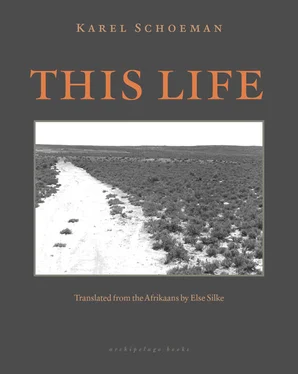At the time we must have been the subject of a great deal of gossip, and what else could be expected, with Jakob’s death and Pieter and Sofie’s disappearance, with Gert and Jacomyn’s sudden and mysterious departure and, finally, my long illness as well; what else could be expected in our small, isolated world where everyone ended up knowing everything about everyone else, that miserable handful of white and coloured people in the boundless desolation at the edge of the mountains? Perhaps they tried to help, as people will in times of affliction or need, and perhaps they made offers of goodwill. I remember the people who helped search for Jakob and the neighbours who attended his funeral, lined up silently along the walls of the voorhuis, but I know that as a child I did not see their presence as a sign of sympathy, but rather as an intrusion. Oh, when I was a child it was just too rare for us to receive visitors, and possibly I was simply unused to it and the curiosity and distrust I remember were no more than imagination on my part. But the unspoken words that I remember just as clearly, the questions and the speculations that I overheard incidentally? Where did a group of men once talk about that day, and someone wondered who had searched for Jakob in the kloof without finding his body where it had been lying all the time? The details I no longer recall, but I remember overhearing the question and waiting for an answer that was never supplied. Those men all knew the answer, and the question and the silence that followed were an accusation, even though it was never uttered. Who searched in that kloof, and how did Jakob lose his footing and, with mangled face, fall down into the narrow cleft between the rocks? I shall never know; neither do I wish to know. It is better so.
Did the neighbours begin to avoid us again after these events, or were they simply discouraged from coming to our home? When visitors arrived, Father was always glad to see them, they were welcomed and coffee was served, or sweet wine or brandy but, just as they remained intruders to me, so they did to Mother as well, and even more so in the time after Jakob’s death and Pieter’s disappearance. People inevitably noticed that there was no welcome in her stiff hospitality and sparse words and gradually they stopped coming again. At last the only visitors who still came, were a neighbour in search of an absconded apprentice or a lost sheep, or a servant sent to borrow an awl or a bag of horseshoe-nails.
Only the small, familiar sounds of the house still filled the silvery days, and the howling of the wind around the corners of the building, against the shutters or in the thatch when I awoke at night and could not fall asleep again. Father still mounted his horse painfully and attended auctions to buy sheep or land; later he bought a black Cape cart in which he set off to attend funerals in the district, but I do not recall Mother often accompanying him, for it was as if she were more withdrawn than ever during those years, though the passion and the zeal and the sudden, unpredictable flashes of temper had intensified. No, actually I cannot remember Mother ever leaving the house in the years after Jakob’s death, except when the minister came from Worcester and there were church meetings on neighbouring farms.
Those meetings and the long journey to Worcester for Nagmaal I remember because they became an ever greater ordeal for me as I grew older. I felt strange and ill at ease among the children of my own age, and awkwardly I hovered at the fringe of their company until it was possible to escape. Once I was standing behind an outspanned cart when I heard a girl ask where I was, and someone said something I could not make out in a cold, disdainful tone. “Oh, that mad creature,” an older woman remarked; and that must have been how I appeared to them, the thin, shy, lisping girl with the scar on her forehead who fled from the people, the tents, the outspanned carts and wagons, to escape from the friendly interaction, shy as a deer in the ridges, dashing away from the people, the voices, the greetings and laughter and jesting, the nicknames, the whispering in corners and the incomprehensible jokes and innuendo, the girls with their arms around each other and the boys to one side with their impertinent glances and their nervous excitement, the approval and disapproval of the older women lined up against the wall, the entire united community of other people into which Mother and Father were briefly assimilated, but in which I could play no part. I turned and fled to the servants’ fire beyond the outspan, and I warmed myself and shared their coffee when it was offered to me, and soon enough they forgot about my presence and continued as if I were not there.
That winter after my illness we all went down to the Karoo as usual and when we returned that spring, Miss Le Roux came with us. Someone had probably brought her from Worcester and Father must have fetched her halfway with the cart, I do not know, for I was told nothing, and even Dulsie spoke only vaguely of the stranger who was coming. However, she came from Worcester to join us in the Karoo before we returned to the Roggeveld, for I was standing in front of our reed house with Maans on my hip when the cart came to a halt and Miss Le Roux climbed down slowly in her black dress. Mother’s formal welcome and my own mystified silence could not have put her at ease and, in fact, she probably never felt at home with us: as strange as she seemed on her arrival at our outspan in the Karoo that afternoon, so she remained to us, in spite of living in our house for two years. I soon found out all about her, but only because I was her sole companion in her loneliness, for I certainly never questioned her, nor did I show the slightest interest.
She had grown up in Worcester: her parents were both dead and of the six daughters the eldest was married, while the youngest lived with her to help with the children; two lived in town and worked as seamstresses, and the remaining two became governesses, and that was how Miss Le Roux came to us in her dusty black dress, with her travelling-case and her trunk, recommended to Father by old Dominee himself, as she often stated emphatically, as if it gave her special standing. She could not have been much older than twenty, a stout, giggling young woman in a black mourning frock, with her effusiveness and excitability and her hiccuping laugh, with her nerves and swoons and sudden tears, her eau de cologne and her vial of smelling salts.
She returned to the Roggeveld with us and the big bed in my room was given to her, while I shared the narrow cot in the corner with Maans; she unpacked her things and hung her black dresses, her black caps and her black cape on the nails in the wall. We spent all day together, she and I, and at night in the dark I listened to her regular breathing in the big bed. She brought along writing paper and quill pens and a knife to sharpen the points and readers in Dutch and English: I knew how to read and write after a fashion, but she made me practise anew and taught me to spell, she read me poems and made me recite them, I learned arithmetic and she told me Bible stories — it was probably all she knew, but it was more than most people in our parts did in those days. I was a quick learner, she said in generous moments, and assured Father that I was a clever girl. Only with sewing and other needlecraft she had no success, in spite of her patience and perseverance, for I was an awkward child and no matter how often she made me unpick the uneven stitches and start over, it only resulted in the cloth becoming even more crumpled. I learned what she could teach me and listened to the lengthy accounts about her sisters and the house where she grew up, and at night I listened to her regular breathing in the dark, but she remained a stranger whose presence I endured silently as she hovered over me, gushing and breathless.
Читать дальше












